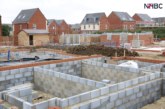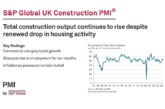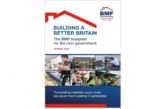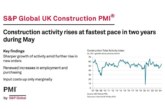
The urgent need to build more homes for everyone should be a key priority for all the political parties during the General Election campaign, says the Federation of Master Builders (FMB). The FMB is calling on all the political parties to make house building a national infrastructure priority, along with 11 other key policy areas in its ‘Programme for Government’.
The programme calls for the political parties to commit to the following:
Housing
- Make house building a national infrastructure priority and build 1.5 million new homes
- Free up more public land for housing and break it up into small plots for small builders
- Invest in local authority planning departments to speed up the planning process
Skills
- Promote vocational education and invest in Further Education
- Reform the UK Apprenticeship Levy so it works better for small companies
- Introduce a fair and balanced post-Brexit immigration system
Quality
- Licence all UK construction companies
- Introduce mandatory warranties for building control-approved work
- Create a new ‘General Builder’ qualification
Net Zero Carbon
- Create a National Retrofit Strategy
- Invest in upskilling builders to build and upgrade homes fit for the future
- Cut VAT on home improvement work to 5%
Brian Berry, Chief Executive of the FMB said: “In this Brexit election the main political parties mustn’t lose sight of the big issues facing the UK such as the current housing crisis. We are still not building enough new homes, and this has led to an affordability crisis and over-crowding. This election is an opportunity for all parties to publish ambitious plans to turn this situation around. Small builders stand ready to help the new Government not only to build more new homes but also make our existing homes more energy efficient.”
Brian concluded: “Small building companies will also be instrumental in helping the future government tackle other major challenges facing the UK, from helping to tackle the climate crisis to helping to building the hospitals and schools of the future. Our Programme for Government gives 12 clear policies for each of the political parties to adopt to support SME builders. Politicians must not only give the country the gift of resolving Brexit this Christmas, but also a vision for the future of our built environment.”
The Programme for Government is available here: https://www.fmb.org.uk/media/50547/fmb-programme-for-government-2019-2024.pdf.
FMB also states that a National Retrofit Strategy is needed to boost the domestic repair and maintenance sector in construction in response to the construction ONS data published, which shows a 3% decline in private housing repair and maintenance.
Brian Berry said: “Homeowners are holding off upgrading and improving their homes due to political and economic uncertainty. The increase in construction output seen in Quarter 3 masks the fact that the repair and maintenance sector has contracted, the bread and butter sector of the construction industry and one which keeps thousands of builders active and in work. This contraction in the private domestic sector even led to a fall in output in September, compared to the previous month. The UK has some of the oldest housing stock in Europe, that urgently needs upgrading. At a time when the Government has set an ambitious target of net zero carbon by 2050, we need to be rolling out energy efficiency measures across our existing housing stock, full steam ahead. The uncertainty is holding us back.”
Berry concluded: “In order to boost consumer confidence, the new government must create a National Retrofit Strategy that sets out how to encourage home owners to upgrade England’s housing stock to the highest levels of energy efficiency. This will not only help reach the 2050 target, but will also address the scourge of fuel poverty which puts a strain on our educational institutions and the NHS. We need to urgently reverse the decline in the repair and maintenance sector which keeps so many builders active in the industry.”









